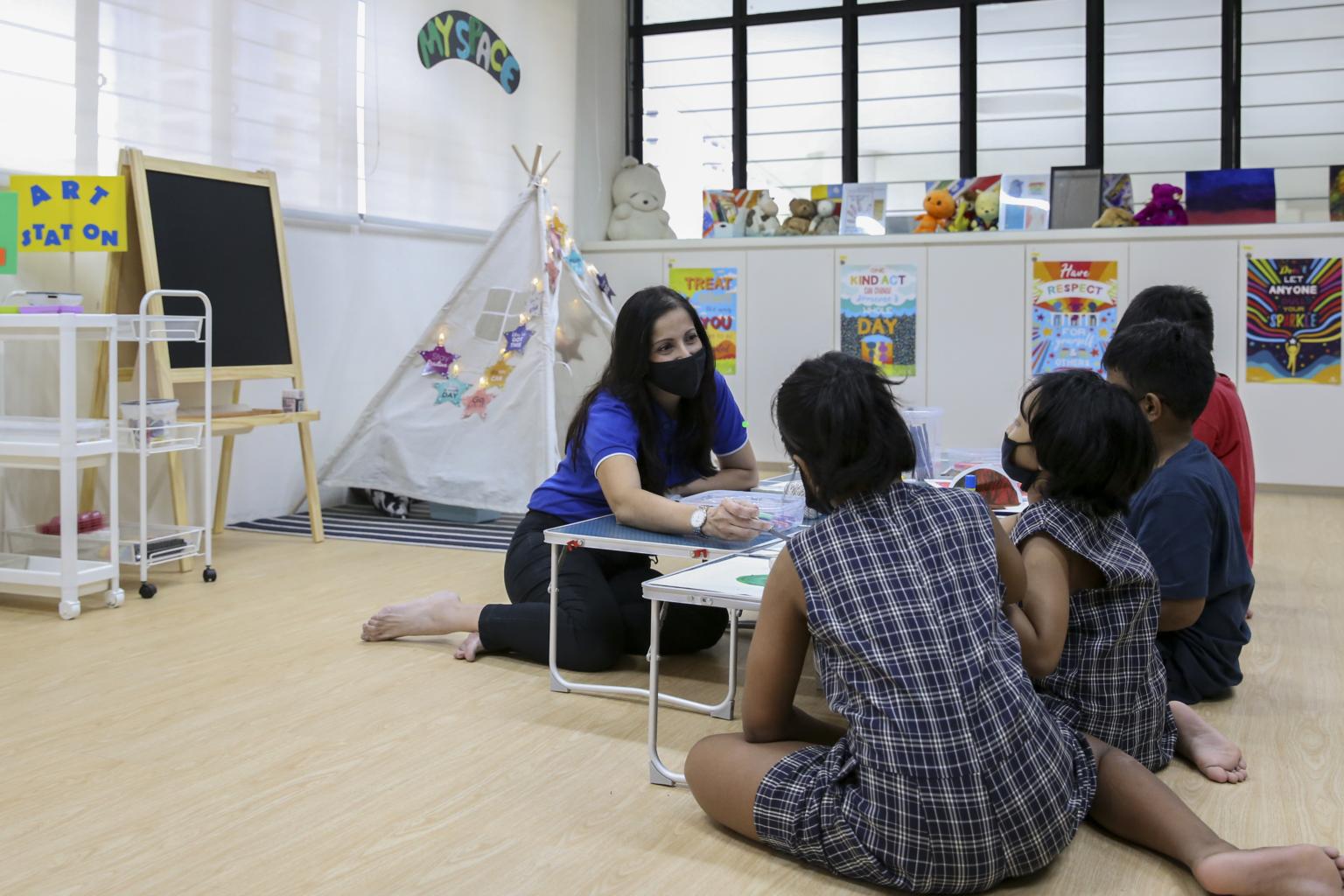Covid-19 drives demand for night-time childcare in Singapore
Sign up now: Get ST's newsletters delivered to your inbox

Programmes Manager Jagdeep Kaur facilitates an arts and crafts activity at CareNights.
ST PHOTO: YONG LI XUAN
SINGAPORE - More people could be working nights to try to make up for income loss during the coronavirus pandemic.
A fourth centre for night-time caregiving services for children from lower-income families, which is run by charity Morning Star Community Services, opens on Monday (Feb 1) in Toa Payoh.
It reflects the growing demand for such services, driven partly by the financial instability wrought by Covid-19, says Ms Jagdeep Kaur, head of programmes and volunteer management at Morning Star.
The new centre, called CareNights @ Agape Village, gives families, including those with parents seeking work, "the opportunity to improve their financial situation while providing their children with a safe, supportive and structured environment in the evenings", she says.
While there has always been a demand for night-time care services, the pandemic has exacerbated demand.
"In my interaction with families we serve, what has stood out is the irregularity of their working hours, which is more pronounced compared with before Covid-19," she says.
The new centre provides caregiving services for children aged six to 14 on weeknights between 6pm and 10pm. It is offered free to households whose gross combined income is below $4,500.
These families include parents who have lost their jobs or have to take on ad hoc work or two jobs because their income has been reduced by Covid-19's effect on the economy.
Other beneficiaries include single parents and grandparents who are the main caregivers of their grandchildren as they may need respite in the evenings.
Located in Agape Village, a social services hub in Toa Payoh, the programme seeks to boost children's social and emotional development and help them develop skills such as critical thinking. Activities such as art and dance are also offered.
Morning Star, which also provides other services such as student care, counselling and parenting workshops, opened its first night-time care centre in 2016 in Bedok.
Two other centres followed - another in Bedok and one in Sengkang. Close to 80 children are enrolled in the four centres altogether.
Housewife Sylvia Tan, 44, is enrolling her younger child at the new centre in Toa Payoh because she hopes to upgrade herself.
"It's a good start for stay-at-home mums who want to work or study," she says.
She hopes that placing her eight-year-old son in CareNights will give her the opportunity to take evening classes under the Government's SkillsFuture Credit scheme or find a night job at a fast-food joint. Her 12-year-old daughter is old enough to stay at home by herself, if necessary.
Her husband's income as a private-hire driver fetching passengers to and from the airport has plummeted. He has switched to doing Covid-19 swab tests to earn money while working as a driver on the side.
To cope with the loss in income, the family spends less on groceries, buying mostly reduced-to-clear items. Ms Tan has also taken to eating her children's leftovers for her meals.
Ms Aida Jinal, 41, who has enrolled her three younger children, aged 10, 11 and 13, in the CareNights programme in Bedok North Avenue 4 since 2019, is also reaping its benefits.
In the middle of last year, the housewife took on a food delivery job to supplement the family income after her eldest child, who is 20, lost her job at a snack store when Covid-19 hit. Ms Aida's husband, 47, does odd jobs.
Ms Aida says the stress she feels about their financial situation eased as she knows her three younger kids have a familiar place where they can spend some hours at night.
She says: "They've got a place to study, where they can have dinner if they want. I feel comfortable with the facilitators there. That gives us some relief."


